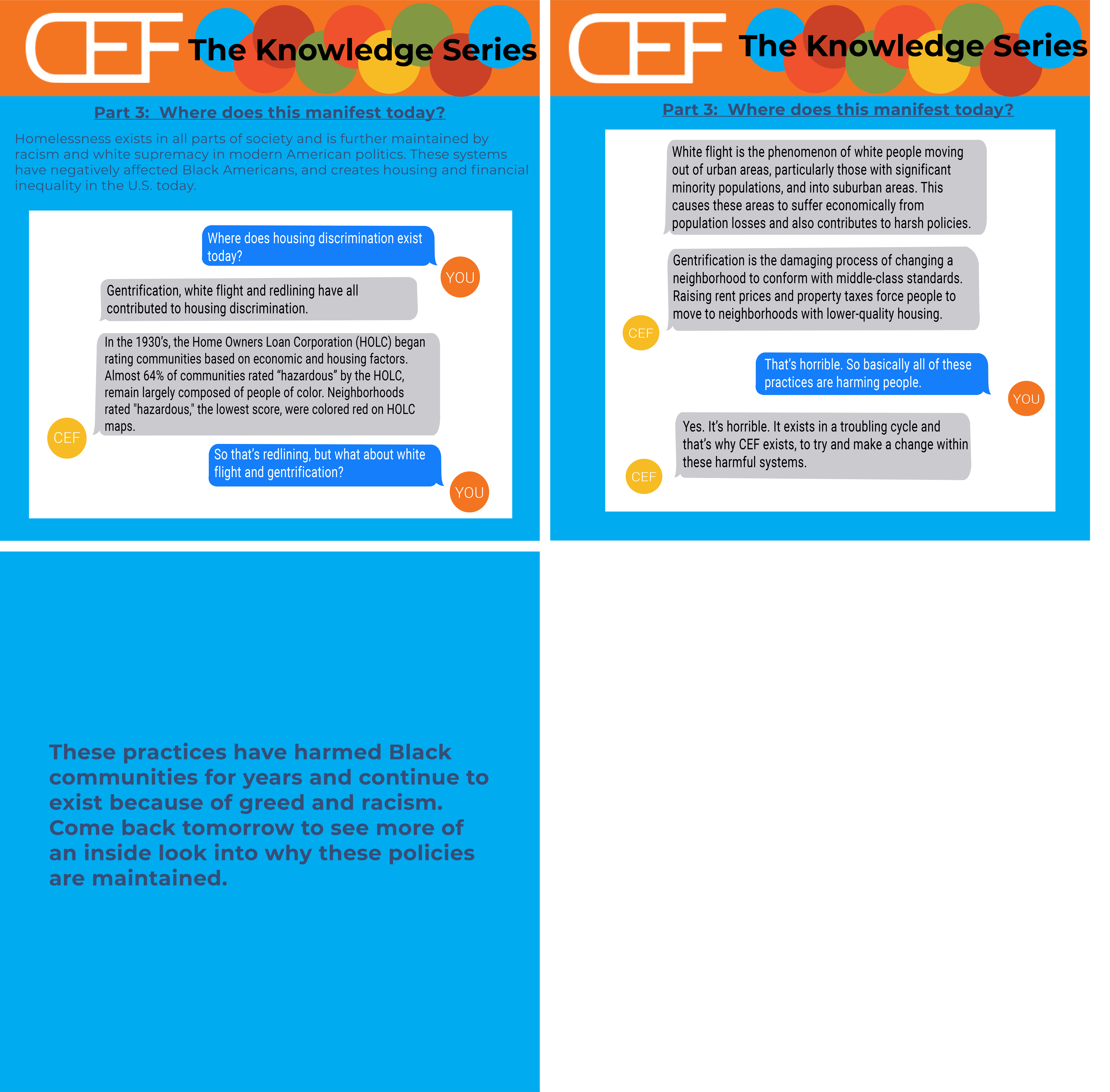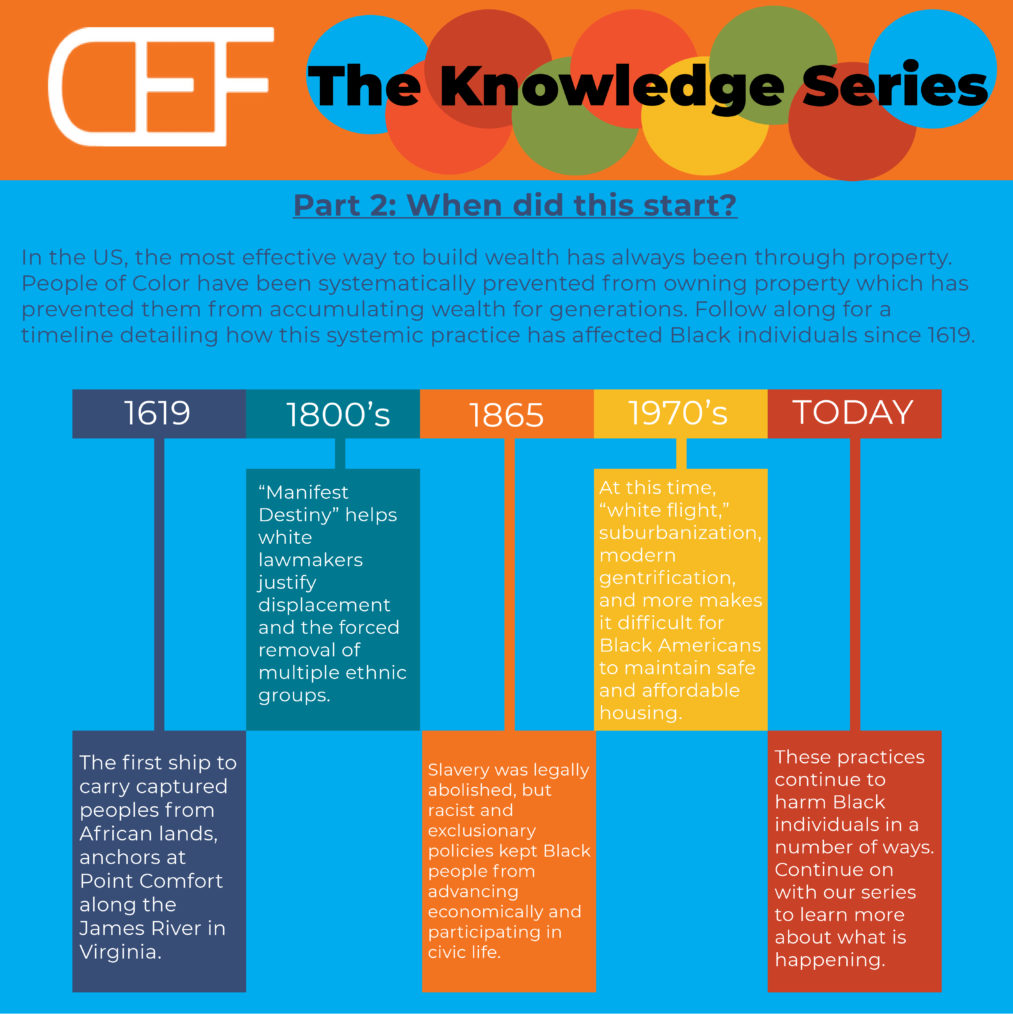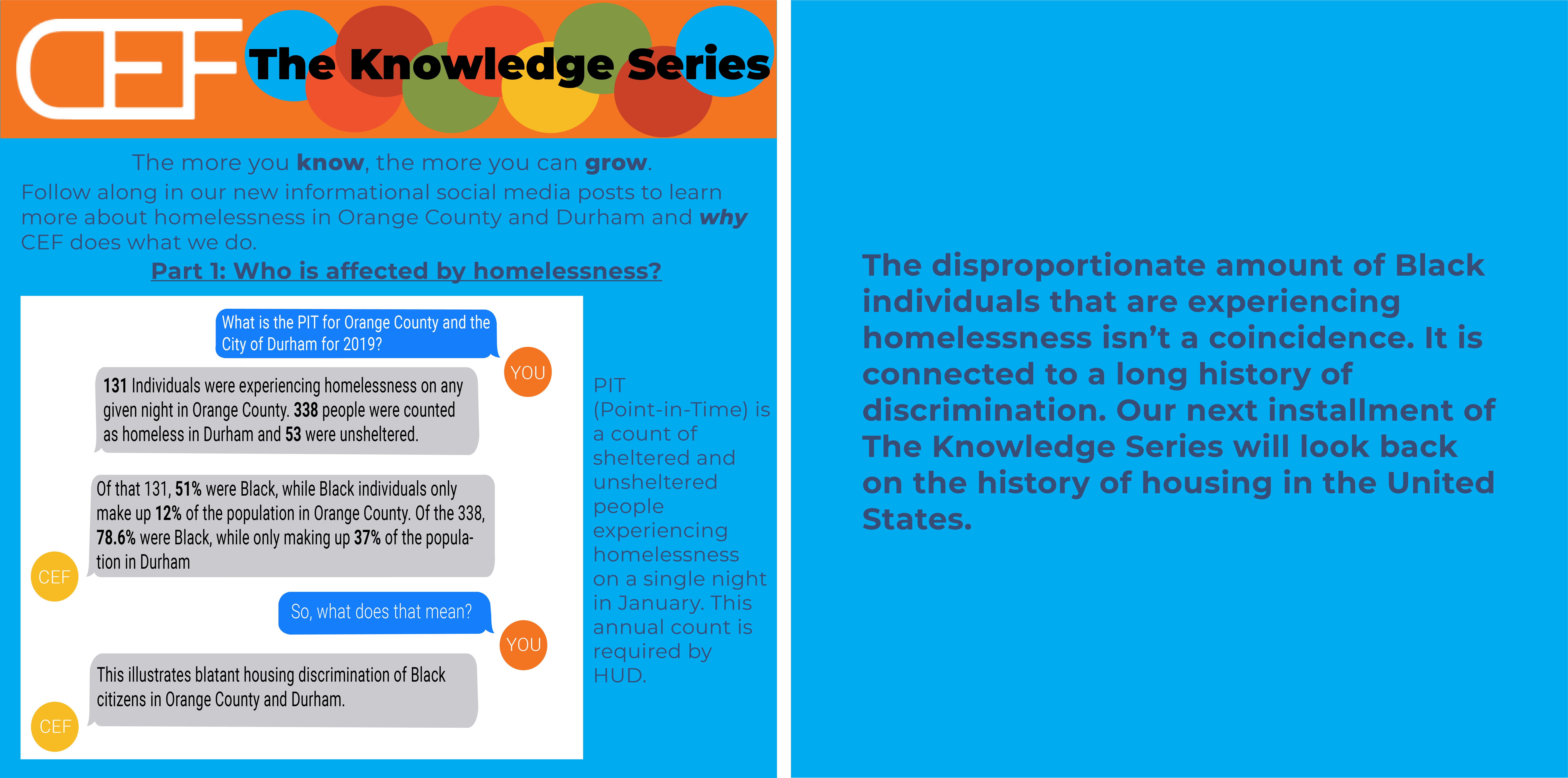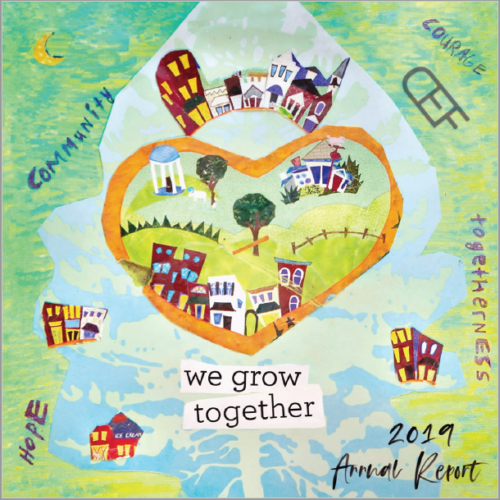The Knowledge Series is a project dedicated to sharing information with our communities on how housing discrimination manifests today. Throughout this week, we will share a series of posts that delve into the history of housing discrimination and what it looks like in our everyday.
Please read our previous posts: Part 1, Part 2, & Part 3.

Part 4: Why do these systems continue to exist?
Systemic housing discrimination is still present in modern-day. While it is illegal to discriminate against someone based on race, Black families are still negatively impacted by discriminatory practices, both past and present. When discriminatory practices are used, ending those practices is not enough for people to experience equity–reparations must be made to repair the harms that have been caused. Since the United States has not participated in reparations for Black families, they are still experiencing extreme disparities, especially in housing and financial security.
We’ve discussed in previous posts that Black people make up 51% of the homeless population in Orange County, while only making up 12% of the general population. American slavery and systemic racism, backed by Jim Crow laws, set Black communities back hundreds of years in their attempts to accumulate wealth and assets. Laws throughout the South mandated racial segregation in almost all public facets and denied Black people basic civil, economic, and social rights, including the right to vote. This continued through the Civil Rights Movement in the 1960s (and some would say still continues today), making the idea of property ownership and asset accrual for Black families nearly unattainable (“Jim Crow Era,” 2020).
These historical elements, as well as more modern practices such as redlining, white* flight, and gentrification, have had a substantial impact in our own backyard. The wealth that Black communities were able to generate in places like Durham, was systematically taken from them throughout the 20th century through such practices. Additionally, the Northside District of Chapel Hill has been heavily gentrified by UNC students in search of off-campus housing.
The University of North Carolina at Chapel Hill was built by enslaved Black people who were exploited for their labor. In the 19th and 20th centuries, Black employees of the university were funneled to the Northside District because it was one of the least proximate areas to campus at the time (DeWulf, 2017). Northside has been a predominantly Black neighborhood for 175 years, but it is now experiencing gentrification as UNC students seek affordable off-campus housing.
Off-campus living has become increasingly popular for college students in Chapel Hill (with 50% of UNC students currently living off-campus). Many students moved to the Northside District specifically for its relatively affordable rental prices. Furthermore, as the university has grown in geographic size, the Northside District is now comparatively closer to campus than many other off-campus housing options (Cheek, 2017). Nearby Carrboro, also being heavily gentrified, has many high-quality restaurants, thrift stores, and boutiques that add additional appeal for college students. The interest in off-campus housing has driven up rent prices throughout the Chapel Hill-Carrboro community, as landlords see no issue with charging college students above-market rents and has pushed Black residents out of the Northside, a reduction of 60% between 1980 and 2010 (DeWulf, 2017).
As Northside becomes more and more “desirable,” middle-class families have also moved into the area. This further isolates longterm residents of the Northside District from their own community. Since white families moving into neighborhoods like Northside make, on average, two times what Black families make, they are more likely to take advantage of low property costs in historically Black neighborhoods in order to buy homes (Badger et al., 2019). Many of these families renovate their new homes, increasing property values, which leads to increased taxes for entire neighborhoods (Badger et al., 2019). As other middle-class families (typically white) see families that look like them and nice-looking houses they are more likely to purchases homes in the same neighborhood, further gentrifying the area.
Durham, as we discussed yesterday, has also been deeply impacted by housing discrimination. Specifically, the impact of redlining on Black communities in Durham has led to long-lasting disparities for Black neighborhoods. In the 1950s-70s, a phenomenon known as white flight occurred throughout the U.S. This was a process of white people moving out of urban areas, particularly those with significant Black and Brown populations, and into suburban areas, in an attempt to distance themselves from communities of color. White flight causes areas to suffer economically from reduced tax income (due to population losses) and also contributes to harsh policies (Semuels, 2015).
In recent years, Durham’s downtown has also been impacted by gentrification as it has become host to many luxury stores, critically-acclaimed restaurants, and crafty boutiques. When businesses like these move into an area they make it difficult for residents who have lived there for decades to keep up with the rapidly increasing cost of living. The practice of gentrification throughout Chapel Hill, Durham, and the rest of the Triangle, has made housing inequality and segregation even worse (DeMarco and Hunt, 2018).
Black people in the United States face racism every day, but it is often overlooked that racism is deeply ingrained in the housing search process. Things like credit checks, background checks, reference letters, and requiring multiple months of rent upfront disproportionately and negatively affect Black people in their housing search. When you throw in systemic barriers and racist practices, like redlining and gentrification, it imposes a greater hardship on low-income and communities of color. Discriminatory housing practices like redlining and gentrification may not seem racist at face value, but hopefully, the posts in this Series have provided some context to the deeply systemic racial barriers that have plagued Black families in their goals of financial independence and housing security for hundreds of years.
Join us tomorrow for some insight into the work CEF is currently doing and to hear why our mission is so important. CEF is actively working to provide resources to Members experiencing homelessness and/or financial hardship and to dismantle oppressive policies and practices that create a cyclical experience of poverty and housing insecurity for Black people and other people of color. This advocacy work, along with continued education among Staff and Advocates, helps us provide the best support for people experiencing homelessness and financial insecurity in Orange and Durham counties.

*In general, CEF uses APA grammar rules in our writing. The APA says that the names of race and ethnic identities should be capitalized, as they are proper nouns. For this series, and moving forward, CEF is intentionally leaving “white” (when referring to a racial identity) lower-cased. We recognize that by capitalizing words we are giving them power and we do not want to encourage white power in any way. Unlike the AP’s explanation for why they are choosing to lower-case “white” we want to be clear that we believe white people do have a shared experience–that is one of privilege. We also believe that undoing racism is the responsibility of white people and worry that implying that white people do not have a shared experience (as the AP does) is a dangerous tactic that is aimed at discounting the responsibility that white people have in undoing racism and white supremacist culture. Ultimately, we know that race is a construct but that racial differences are not. They are real and need to be addressed directly. For any questions or clarifications around CEF’s choice of words please contact ari rosenberg (arir[at]communityef.org).
Badger, E., Bui, Q., & Gebeloff, R. (2019, April 27). The Neighborhood is Mostly Black. The Homebuyers Are Mostly White. The New York Times. https://www.nytimes.com/interactive/2019/04/27/upshot/diversity-housing-maps-raleigh-gentrification.html?searchResultPosition=1
Cheek, S. (2017, April 6). Competition for housing helps drive Chapel Hill rent up to highest in state. The Daily Tar Heel. https://www.dailytarheel.com/article/2017/04/increase-in-chapel-hill-rent-prices-driven-by-competition-for-housing
De Marco, A., & Hunt, H. (2018). Racial Inequality, Poverty and Gentrification in Durham, North Carolina. North Carolina Poverty Research Fund. https://fpg.unc.edu/sites/fpg.unc.edu/files/resources/reports-and-policy-briefs/durham_final_web.pdf
DeWulf, S. (2017, March 2). Saving Northside, the largest black community in Chapel Hill. Omnibus. http://mejo457.web.unc.edu/2017/03/saving-northside-the-largest-black-community-in-chapel-hill/
Jim Crow Era. A Brief History of Civil Rights in the United States. (2020, July 28). Georgetown Law Library. https://guides.ll.georgetown.edu/c.php?g=592919&p=4172697
Semuels, A. (2015, July 30). White Flight Never Ended. The Atlantic. Retrieved from https://www.theatlantic.com/business/archive/2015/07/white-flight-alive-and-well/399980/








